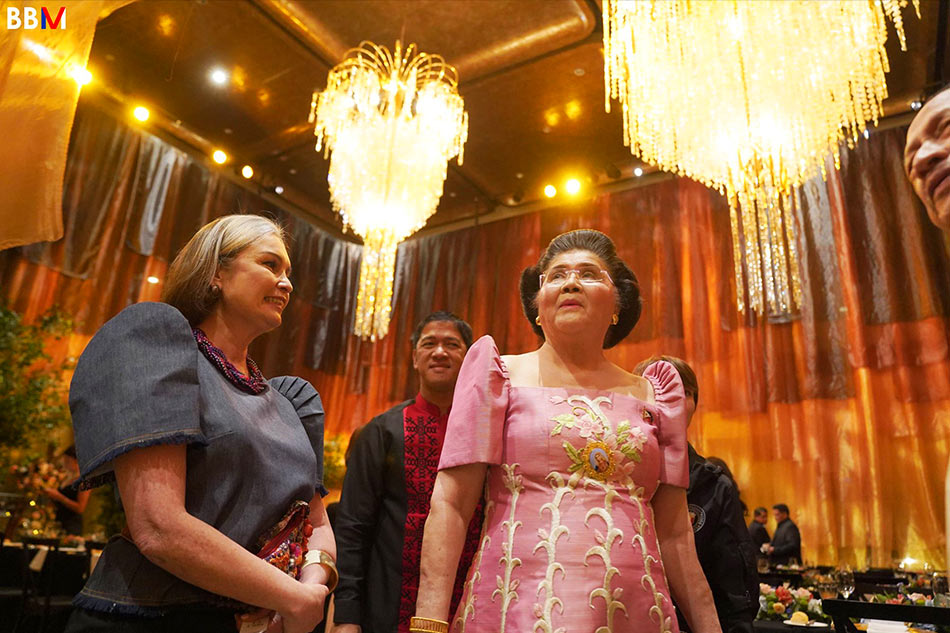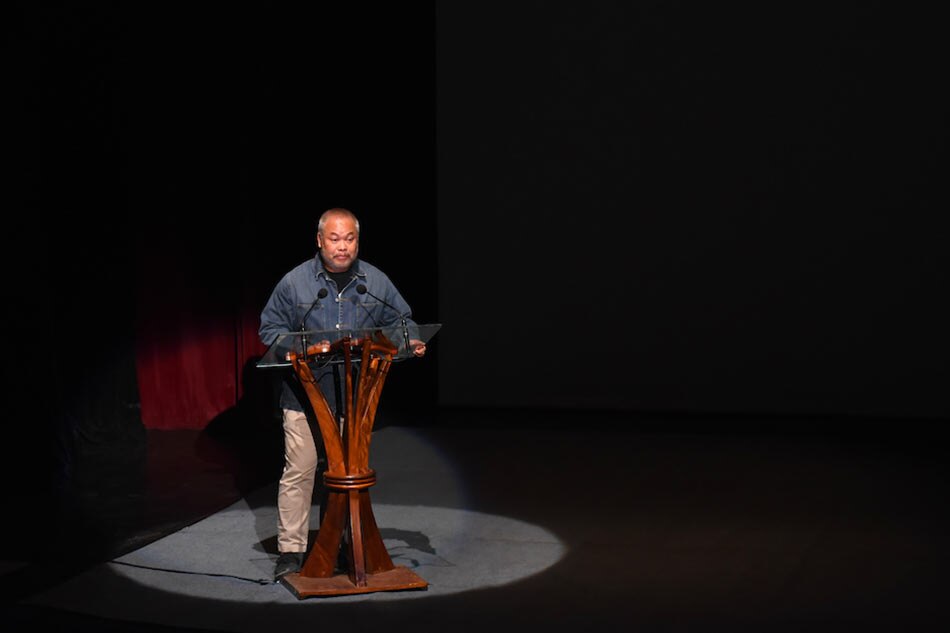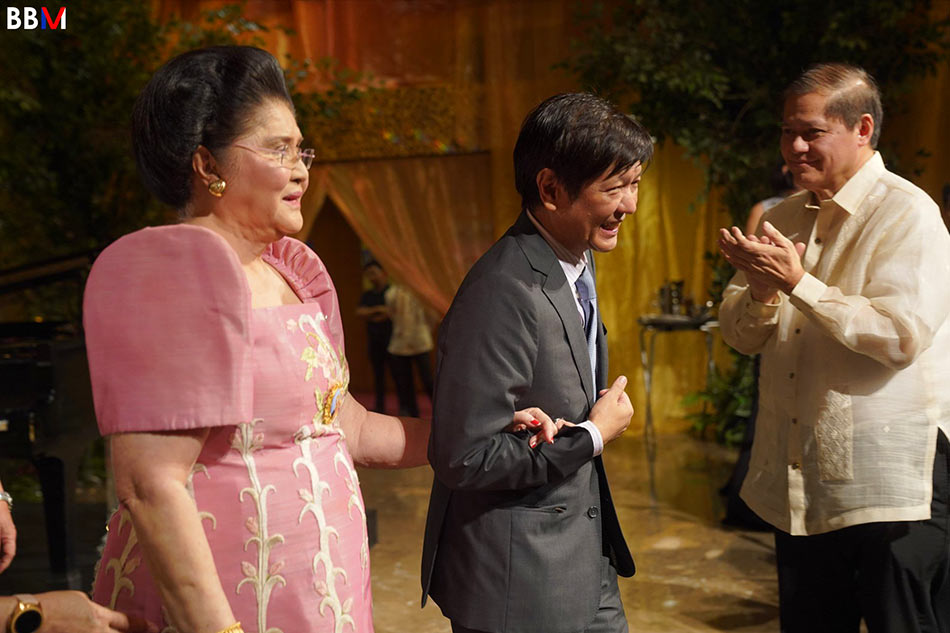The curious case of ‘The Kingmaker,’ a damning docu about Imelda, that premiered at the CCP | ABS-CBN

Welcome, Kapamilya! We use cookies to improve your browsing experience. Continuing to use this site means you agree to our use of cookies. Tell me more!
The curious case of ‘The Kingmaker,’ a damning docu about Imelda, that premiered at the CCP
The curious case of ‘The Kingmaker,’ a damning docu about Imelda, that premiered at the CCP
Miguel Dumaual,
ABS-CBN News
Published Jan 30, 2020 07:47 PM PHT
|
Updated Jan 30, 2020 08:26 PM PHT
MANILA — On January 15, the Cultural Center of the Philippines (CCP) hosted a lavish dinner “in honor” of Imelda Marcos to celebrate its 50th anniversary, and only weeks later, on January 29, became the venue of a damning documentary about the former first lady.
MANILA — On January 15, the Cultural Center of the Philippines (CCP) hosted a lavish dinner “in honor” of Imelda Marcos to celebrate its 50th anniversary, and only weeks later, on January 29, became the venue of a damning documentary about the former first lady.
Imelda, the wife of the late dictator Ferdinand Marcos, was the founding chairperson of the CCP. The sprawling complex for the arts was among her first projects as first lady and she was its main patron for 17 years.
Imelda, the wife of the late dictator Ferdinand Marcos, was the founding chairperson of the CCP. The sprawling complex for the arts was among her first projects as first lady and she was its main patron for 17 years.
“The Kingmaker,” a documentary by Emmy-winning filmmaker Lauren Greenfield, looks back on the notorious extravagance of Imelda — a stark contrast to the human rights abuses and corruption that marred the Marcos regime. The film also touches on Imelda’s so-called “edifice complex” that produced the Manila Film Center and the CCP, among others.
“The Kingmaker,” a documentary by Emmy-winning filmmaker Lauren Greenfield, looks back on the notorious extravagance of Imelda — a stark contrast to the human rights abuses and corruption that marred the Marcos regime. The film also touches on Imelda’s so-called “edifice complex” that produced the Manila Film Center and the CCP, among others.
That the CCP held an “appreciation dinner” for Imelda, who is out on bail following her graft conviction, and in the same month became the venue of the Philippine premiere of “The Kingmaker,” is an irony not lost on its officials.
That the CCP held an “appreciation dinner” for Imelda, who is out on bail following her graft conviction, and in the same month became the venue of the Philippine premiere of “The Kingmaker,” is an irony not lost on its officials.
ADVERTISEMENT
During the gala screening of “The Kingmaker” at the Tanghalang Aurelio Tolentino, CCP vice president and artistic director Chris Millado said he had been asked “several times" these past weeks why the film is being shown at the venue.
During the gala screening of “The Kingmaker” at the Tanghalang Aurelio Tolentino, CCP vice president and artistic director Chris Millado said he had been asked “several times" these past weeks why the film is being shown at the venue.
“First, because People Power,” he told an audience that included Martial Law victims Etta Rosales and May Rodriguez, who were interviewed in the documentary.
“First, because People Power,” he told an audience that included Martial Law victims Etta Rosales and May Rodriguez, who were interviewed in the documentary.
February will mark the 34th anniversary of the historic uprising — a movement, in Millado’s words, that “effectively ousted the oppressive Marcos regime, but tragically ineffective in uprooting the conditions and system that allow the return of tyrants.”
February will mark the 34th anniversary of the historic uprising — a movement, in Millado’s words, that “effectively ousted the oppressive Marcos regime, but tragically ineffective in uprooting the conditions and system that allow the return of tyrants.”
Not shying away from the topic of the CCP’s grand welcome for Imelda two weeks prior, Millado said, “Beyond the controversial dinner that happened at the main lobby a floor just above us, several events pertaining to the return of the Marcoses remind us about the vulnerability of cultural memory, and the fragility of the democratic legacy of People Power.”
Not shying away from the topic of the CCP’s grand welcome for Imelda two weeks prior, Millado said, “Beyond the controversial dinner that happened at the main lobby a floor just above us, several events pertaining to the return of the Marcoses remind us about the vulnerability of cultural memory, and the fragility of the democratic legacy of People Power.”
“The Kingmaker,” which director Greenfield had originally intended to focus on Imelda, expanded over its five years of production to include the Marcoses’ efforts to return to political power — specifically, the 2016 vice-presidential bid of her son Bongbong Marcos, and their alleged ties with President Rodrigo Duterte.
“The Kingmaker,” which director Greenfield had originally intended to focus on Imelda, expanded over its five years of production to include the Marcoses’ efforts to return to political power — specifically, the 2016 vice-presidential bid of her son Bongbong Marcos, and their alleged ties with President Rodrigo Duterte.
The showing of “The Kingmaker” is also fitting for the CCP’s 50th anniversary, Millado said, as he brought up the contentious history of the arts venue.
The showing of “The Kingmaker” is also fitting for the CCP’s 50th anniversary, Millado said, as he brought up the contentious history of the arts venue.
Quoting National Artist for Literature Resil Mojares, he said, “CCP was founded in 1969, but it was born in 1986.”
Quoting National Artist for Literature Resil Mojares, he said, “CCP was founded in 1969, but it was born in 1986.”
With the end of the Marcos dictatorship, the CCP “went through a process of reorientation that made its programs more inclusive of previously marginalized sectors and artistic expressions,” Millado said.
With the end of the Marcos dictatorship, the CCP “went through a process of reorientation that made its programs more inclusive of previously marginalized sectors and artistic expressions,” Millado said.
“I value the indelible contribution of artists before that time,” he added, referring to 1986 revolution. “I embrace the thoughtful and critical leadership that followed after. This is the mixed artistic legacy that I, and many of my colleagues here at the CCP, embrace.”
“I value the indelible contribution of artists before that time,” he added, referring to 1986 revolution. “I embrace the thoughtful and critical leadership that followed after. This is the mixed artistic legacy that I, and many of my colleagues here at the CCP, embrace.”
The final reason for screening “The Kingmaker” at the CCP, Millado said, is “because we should never forget” — a statement that prompted applause from the audience.
The final reason for screening “The Kingmaker” at the CCP, Millado said, is “because we should never forget” — a statement that prompted applause from the audience.
“Today, we sit in this wondrous space, where we can experience the creative expressions of artists in relative safety. But we should remember that this is the fruit of struggle of hundreds, even thousands of cultural activists who painted murals about the struggle against dictatorship in the streets; who sang songs about farmers, workers, the urban poor; who wrote poems about the violation of human rights; and who performed plays about the continuing struggle — all done at the risk of personal safety and even their lives.”
“Today, we sit in this wondrous space, where we can experience the creative expressions of artists in relative safety. But we should remember that this is the fruit of struggle of hundreds, even thousands of cultural activists who painted murals about the struggle against dictatorship in the streets; who sang songs about farmers, workers, the urban poor; who wrote poems about the violation of human rights; and who performed plays about the continuing struggle — all done at the risk of personal safety and even their lives.”
“We will not forget their sacrifice and their struggles,” he said.
“We will not forget their sacrifice and their struggles,” he said.
Addressing cultural workers and fellow artists, Millado said he hopes the film will be “an inspiration of how we can harness the potency of art to combat this spreadable virus — the virus of idiocy and indifference.”
Addressing cultural workers and fellow artists, Millado said he hopes the film will be “an inspiration of how we can harness the potency of art to combat this spreadable virus — the virus of idiocy and indifference.”
ADVERTISEMENT
ADVERTISEMENT





